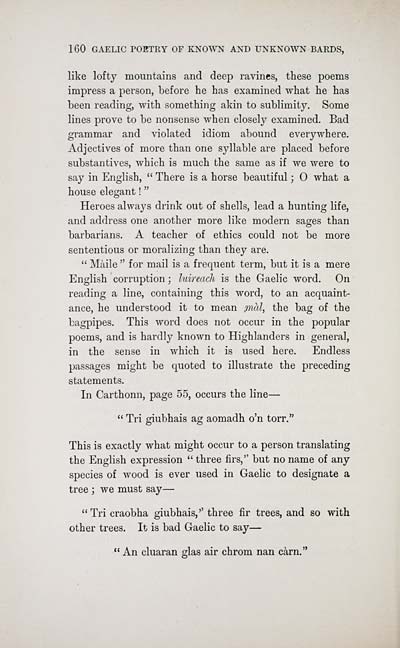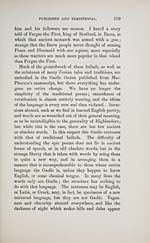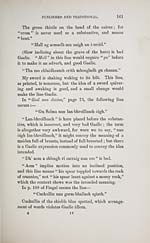Download files
Complete book:
Individual page:
Thumbnail gallery: Grid view | List view

160 GAELIC POETRY OF KNOWN AND UNKNOWN BARDS,
like lofty mountains and deep ravines, these poems
impress a person, before he has examined what he has
been reading, with something akin to sublimity. Some
lines prove to be nonsense when closely examined. Bad
grammar and violated idiom abound everywhere.
Adjectives of more than one syllable are placed before
substantives, which is much the same as if we were to
say in English, " There is a horse beautiful ; what a
house elegant ! "
Heroes always drink out of shells, lead a hunting life,
and address one another more like modern sages than
barbarians. A teacher of ethics could not be more
sententious or moralizing than they are.
" Màile " for mail is a frequent term, but it is a mere
English corruption ; luireach is the Gaelic word. On
reading a line, containing this word, to an acquaint-
ance, he understood it to mean ,màl, the bag of the
bagpipes. This word does not occur in the popular
poems, and is hardly known to Highlanders in general,
in the sense in which it is used here. Endless
passages might be quoted to illustrate the preceding
statements.
In Carthonn, page 55, occurs the line —
" Tri giubhais ag aomadh o'n torr."
This is exactly what might occur to a person translating
the English expression " three firs," but no name of any
species of wood is ever used in Gaelic to designate a
tree ; we must say —
"Tri craobha giubhais,'' three fir trees, and so with
other trees. It is bad Gaelic to say —
" An cluaran glas air chrom nan cam."
like lofty mountains and deep ravines, these poems
impress a person, before he has examined what he has
been reading, with something akin to sublimity. Some
lines prove to be nonsense when closely examined. Bad
grammar and violated idiom abound everywhere.
Adjectives of more than one syllable are placed before
substantives, which is much the same as if we were to
say in English, " There is a horse beautiful ; what a
house elegant ! "
Heroes always drink out of shells, lead a hunting life,
and address one another more like modern sages than
barbarians. A teacher of ethics could not be more
sententious or moralizing than they are.
" Màile " for mail is a frequent term, but it is a mere
English corruption ; luireach is the Gaelic word. On
reading a line, containing this word, to an acquaint-
ance, he understood it to mean ,màl, the bag of the
bagpipes. This word does not occur in the popular
poems, and is hardly known to Highlanders in general,
in the sense in which it is used here. Endless
passages might be quoted to illustrate the preceding
statements.
In Carthonn, page 55, occurs the line —
" Tri giubhais ag aomadh o'n torr."
This is exactly what might occur to a person translating
the English expression " three firs," but no name of any
species of wood is ever used in Gaelic to designate a
tree ; we must say —
"Tri craobha giubhais,'' three fir trees, and so with
other trees. It is bad Gaelic to say —
" An cluaran glas air chrom nan cam."
Set display mode to: Large image | Transcription
Images and transcriptions on this page, including medium image downloads, may be used under the Creative Commons Attribution 4.0 International Licence unless otherwise stated. ![]()
| Early Gaelic Book Collections > Matheson Collection > Popular tales of the west Highlands > Volume 4 > (176) |
|---|
| Permanent URL | https://digital.nls.uk/81489169 |
|---|
| Description | Volume IV. |
|---|---|
| Shelfmark | Mat.77 |
| Additional NLS resources: | |
| Attribution and copyright: |
|
| Description | Items from a collection of 170 volumes relating to Gaelic matters. Mainly philological works in the Celtic and some non-Celtic languages. Some books extensively annotated by Angus Matheson, the first Professor of Celtic at Glasgow University. |
|---|
| Description | Selected items from five 'Special and Named Printed Collections'. Includes books in Gaelic and other Celtic languages, works about the Gaels, their languages, literature, culture and history. |
|---|

